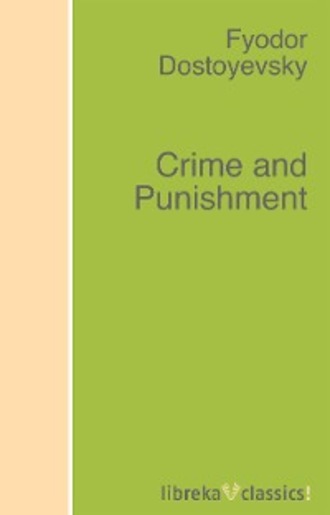
Полная версия
Crime and Punishment


Titel: Crime and Punishment
von ca. 337-422 Faxian, Sir Samuel White Baker, Sax Rohmer, Bernardin de Saint-Pierre, Maria Edgeworth, Saint Sir Thomas More, Herodotus, L. Mühlbach, Herbert Allen Giles, G. K. Chesterton, Algernon Charles Swinburne, Rudyard Kipling, A. J. O'Reilly, William Bray, O. Henry, graf Leo Tolstoy, Anonymous, Lewis Wallace, Johann Wolfgang von Goethe, Edgar Allan Poe, Jack London, Elizabeth Cleghorn Gaskell, Jules Verne, Frank Frankfort Moore, Susan Fenimore Cooper, Anthony Trollope, Henry James, T. Smollett, Thomas Burke, Emma Goldman, George Eliot, Henry Rider Haggard, Baron Thomas Babington Macaulay Macaulay, A. Maynard Barbour, Edmund Burke, Gerold K. Rohner, Bernard Shaw, Sir Joshua Reynolds, Bret Harte, Nathaniel Hawthorne, Jerome K. Jerome, Isabella L. Bird, Christoph Martin Wieland, Rainer Maria Rilke, Ludwig Anzengruber, Freiherr von Ludwig Achim Arnim, G. Harvey Ralphson, John Galsworthy, George Sand, Pierre Loti, Fyodor Dostoyevsky, Giambattista Basile, Homer, John Webster, P. G. Wodehouse, William Shakespeare, Edward Payson Roe, Sir Walter Raleigh, Victor [pseud.] Appleton, Arnold Bennett, James Fenimore Cooper, James Hogg, Richard Harding Davis, Ernest Thompson Seton, William MacLeod Raine, E. Phillips Oppenheim, Maksim Gorky, Henrik Ibsen, George MacDonald, Sir Max Beerbohm, Lucy Larcom, Various, Sir Robert S. Ball, Charles Darwin, Charles Reade, Adelaide Anne Procter, Joseph Conrad, Joel Chandler Harris, Joseph Crosby Lincoln, Alexander Whyte, Kate Douglas Smith Wiggin, James Lane Allen, Richard Jefferies, Honoré de Balzac, Wilhelm Busch, General Robert Edward Lee, Charles Dickens, Wilkie Collins, David Cory, Booth Tarkington, George Rawlinson, Sir Arthur Conan Doyle, Dinah Maria Mulock Craik, Christopher Evans, Thomas Henry Huxley, Mary Roberts Rinehart, Erskine Childers, Alice Freeman Palmer, Florence Converse, William Congreve, Stephen Crane, Madame de La Fayette, United States. Army. Corps of Engineers. Manhattan District, Willa Sibert Cather, Anna Katharine Green, Oliver Wendell Holmes, Charlotte M. Brame, Alphonse Daudet, Booker T. Washington, Clemens Brentano, Sylvester Mowry, Geoffrey Chaucer, Ellen Anderson Gholson Glasgow, Gail Hamilton, William Roscoe Thayer, Margaret Wade Campbell Deland, Rafael Sabatini, Archibald Henderson, Albert Payson Terhune, George Wharton James, Padraic Colum, James MacCaffrey, John Albert Macy, Annie Sullivan, Helen Keller, Walter Pater, Sir Richard Francis Burton, Baron de Jean-Baptiste-Antoine-Marcelin Marbot, Aristotle, Gustave Flaubert, 12th cent. de Troyes Chrétien, Valentine Williams, Thomas Wentworth Higginson, Alexandre Dumas fils, John Gay, Andrew Lang, Hester Lynch Piozzi, Jeffery Farnol, Alexander Pope, George Henry Borrow, Mark Twain, Francis Bacon, Margaret Pollock Sherwood, Henry Walter Bates, Thornton W. Burgess, Edmund G. Ross, William Alexander Linn, Voltaire, Giles Lytton Strachey, Henry Ossian Flipper, Émile Gaboriau, Arthur B. Reeve, Hugh Latimer, Baron Edward Bulwer Lytton Lytton, Benito Pérez Galdós, Robert Smythe Hichens, Niccolò Machiavelli, Prosper Mérimée, Ivan Sergeevich Turgenev, Anatole Cerfberr, Jules François Christophe, Victor Cherbuliez, Edgar B. P. Darlington, David Grayson, Mihai Nadin, Helen Beecher Long, Plutarch, Harriet Beecher Stowe, Margaret E. Sangster, Herman Melville, John Keats, Fannie Isabel Sherrick, Maurice Baring, William Terence Kane, Mary Russell Mitford, Henry Drummond, Rabindranath Tagore, Hubert Howe Bancroft, Charlotte Mary Yonge, William Dean Howells, Jesse F. Bone, Basil Hall Chamberlain, William Makepeace Thackeray, Samuel Butler, Frances Hodgson Burnett, E. Prentiss, Sir Walter Scott, Alexander K. McClure, David Livingstone, Bram Stoker, Victor Hugo, Patañjali, Amelia Ruth Gere Mason, Bertrand Russell, Alfred Russel Wallace, Molière, Robert Louis Stevenson, Simona Sumanaru, Michael Hart, Edmund Gosse, Samuel Smiles, Pierre Corneille, Clarence Edward Mulford, Mrs. Oliphant
ISBN 978-3-7429-2459-9
Alle Rechte vorbehalten.
Es ist ohne vorherige schriftliche Erlaubnis nicht gestattet, dieses Werk im Ganzen oder in Teilen zu vervielfältigen oder zu veröffentlichen.
CRIME AND PUNISHMENT
By Fyodor Dostoevsky
Translated By Constance Garnett
Contents
TRANSLATOR'S PREFACE CRIME AND PUNISHMENT
PART I CHAPTER I CHAPTER II CHAPTER III CHAPTER IV CHAPTER V CHAPTER VI CHAPTER VII PART II CHAPTER I CHAPTER II CHAPTER III CHAPTER IV CHAPTER V CHAPTER VI CHAPTER VII PART III CHAPTER I CHAPTER II CHAPTER III CHAPTER IV CHAPTER V CHAPTER VI PART IV CHAPTER I CHAPTER II CHAPTER III CHAPTER IV CHAPTER V CHAPTER VI PART V CHAPTER I CHAPTER II CHAPTER III CHAPTER IV CHAPTER V PART VI CHAPTER I CHAPTER II CHAPTER III CHAPTER IV CHAPTER V CHAPTER VI CHAPTER VII CHAPTER VIIIEPILOGUE
TRANSLATOR'S PREFACE
A few words about Dostoevsky himself may help the English reader to understand his work.
Dostoevsky was the son of a doctor. His parents were very hard-working and deeply religious people, but so poor that they lived with their five children in only two rooms. The father and mother spent their evenings in reading aloud to their children, generally from books of a serious character.
Though always sickly and delicate Dostoevsky came out third in the final examination of the Petersburg school of Engineering. There he had already begun his first work, "Poor Folk."
This story was published by the poet Nekrassov in his review and was received with acclamations. The shy, unknown youth found himself instantly something of a celebrity. A brilliant and successful career seemed to open before him, but those hopes were soon dashed. In 1849 he was arrested.
Though neither by temperament nor conviction a revolutionist, Dostoevsky was one of a little group of young men who met together to read Fourier and Proudhon. He was accused of "taking part in conversations against the censorship, of reading a letter from Byelinsky to Gogol, and of knowing of the intention to set up a printing press." Under Nicholas I. (that "stern and just man," as Maurice Baring calls him) this was enough, and he was condemned to death. After eight months' imprisonment he was with twenty-one others taken out to the Semyonovsky Square to be shot. Writing to his brother Mihail, Dostoevsky says: "They snapped words over our heads, and they made us put on the white shirts worn by persons condemned to death. Thereupon we were bound in threes to stakes, to suffer execution. Being the third in the row, I concluded I had only a few minutes of life before me. I thought of you and your dear ones and I contrived to kiss Plestcheiev and Dourov, who were next to me, and to bid them farewell. Suddenly the troops beat a tattoo, we were unbound, brought back upon the scaffold, and informed that his Majesty had spared us our lives." The sentence was commuted to hard labour.
One of the prisoners, Grigoryev, went mad as soon as he was untied, and never regained his sanity.
The intense suffering of this experience left a lasting stamp on Dostoevsky's mind. Though his religious temper led him in the end to accept every suffering with resignation and to regard it as a blessing in his own case, he constantly recurs to the subject in his writings. He describes the awful agony of the condemned man and insists on the cruelty of inflicting such torture. Then followed four years of penal servitude, spent in the company of common criminals in Siberia, where he began the "Dead House," and some years of service in a disciplinary battalion.
He had shown signs of some obscure nervous disease before his arrest and this now developed into violent attacks of epilepsy, from which he suffered for the rest of his life. The fits occurred three or four times a year and were more frequent in periods of great strain. In 1859 he was allowed to return to Russia. He started a journal—"Vremya," which was forbidden by the Censorship through a misunderstanding. In 1864 he lost his first wife and his brother Mihail. He was in terrible poverty, yet he took upon himself the payment of his brother's debts. He started another journal—"The Epoch," which within a few months was also prohibited. He was weighed down by debt, his brother's family was dependent on him, he was forced to write at heart-breaking speed, and is said never to have corrected his work. The later years of his life were much softened by the tenderness and devotion of his second wife.
In June 1880 he made his famous speech at the unveiling of the monument to Pushkin in Moscow and he was received with extraordinary demonstrations of love and honour.
A few months later Dostoevsky died. He was followed to the grave by a vast multitude of mourners, who "gave the hapless man the funeral of a king." He is still probably the most widely read writer in Russia.
In the words of a Russian critic, who seeks to explain the feeling inspired by Dostoevsky: "He was one of ourselves, a man of our blood and our bone, but one who has suffered and has seen so much more deeply than we have his insight impresses us as wisdom... that wisdom of the heart which we seek that we may learn from it how to live. All his other gifts came to him from nature, this he won for himself and through it he became great."
CRIME AND PUNISHMENT
PART I
CHAPTER I
On an exceptionally hot evening early in July a young man came out of the garret in which he lodged in S. Place and walked slowly, as though in hesitation, towards K. bridge.
He had successfully avoided meeting his landlady on the staircase. His garret was under the roof of a high, five-storied house and was more like a cupboard than a room. The landlady who provided him with garret, dinners, and attendance, lived on the floor below, and every time he went out he was obliged to pass her kitchen, the door of which invariably stood open. And each time he passed, the young man had a sick, frightened feeling, which made him scowl and feel ashamed. He was hopelessly in debt to his landlady, and was afraid of meeting her.
This was not because he was cowardly and abject, quite the contrary; but for some time past he had been in an overstrained irritable condition, verging on hypochondria. He had become so completely absorbed in himself, and isolated from his fellows that he dreaded meeting, not only his landlady, but anyone at all. He was crushed by poverty, but the anxieties of his position had of late ceased to weigh upon him. He had given up attending to matters of practical importance; he had lost all desire to do so. Nothing that any landlady could do had a real terror for him. But to be stopped on the stairs, to be forced to listen to her trivial, irrelevant gossip, to pestering demands for payment, threats and complaints, and to rack his brains for excuses, to prevaricate, to lie—no, rather than that, he would creep down the stairs like a cat and slip out unseen.
This evening, however, on coming out into the street, he became acutely aware of his fears.
"I want to attempt a thing like that and am frightened by these trifles," he thought, with an odd smile. "Hm... yes, all is in a man's hands and he lets it all slip from cowardice, that's an axiom. It would be interesting to know what it is men are most afraid of. Taking a new step, uttering a new word is what they fear most.... But I am talking too much. It's because I chatter that I do nothing. Or perhaps it is that I chatter because I do nothing. I've learned to chatter this last month, lying for days together in my den thinking... of Jack the Giant-killer. Why am I going there now? Am I capable of that? Is that serious? It is not serious at all. It's simply a fantasy to amuse myself; a plaything! Yes, maybe it is a plaything."
The heat in the street was terrible: and the airlessness, the bustle and the plaster, scaffolding, bricks, and dust all about him, and that special Petersburg stench, so familiar to all who are unable to get out of town in summer—all worked painfully upon the young man's already overwrought nerves. The insufferable stench from the pot-houses, which are particularly numerous in that part of the town, and the drunken men whom he met continually, although it was a working day, completed the revolting misery of the picture. An expression of the profoundest disgust gleamed for a moment in the young man's refined face. He was, by the way, exceptionally handsome, above the average in height, slim, well-built, with beautiful dark eyes and dark brown hair. Soon he sank into deep thought, or more accurately speaking into a complete blankness of mind; he walked along not observing what was about him and not caring to observe it. From time to time, he would mutter something, from the habit of talking to himself, to which he had just confessed. At these moments he would become conscious that his ideas were sometimes in a tangle and that he was very weak; for two days he had scarcely tasted food.
He was so badly dressed that even a man accustomed to shabbiness would have been ashamed to be seen in the street in such rags. In that quarter of the town, however, scarcely any shortcoming in dress would have created surprise. Owing to the proximity of the Hay Market, the number of establishments of bad character, the preponderance of the trading and working class population crowded in these streets and alleys in the heart of Petersburg, types so various were to be seen in the streets that no figure, however queer, would have caused surprise. But there was such accumulated bitterness and contempt in the young man's heart, that, in spite of all the fastidiousness of youth, he minded his rags least of all in the street. It was a different matter when he met with acquaintances or with former fellow students, whom, indeed, he disliked meeting at any time. And yet when a drunken man who, for some unknown reason, was being taken somewhere in a huge waggon dragged by a heavy dray horse, suddenly shouted at him as he drove past: "Hey there, German hatter" bawling at the top of his voice and pointing at him—the young man stopped suddenly and clutched tremulously at his hat. It was a tall round hat from Zimmerman's, but completely worn out, rusty with age, all torn and bespattered, brimless and bent on one side in a most unseemly fashion. Not shame, however, but quite another feeling akin to terror had overtaken him.
"I knew it," he muttered in confusion, "I thought so! That's the worst of all! Why, a stupid thing like this, the most trivial detail might spoil the whole plan. Yes, my hat is too noticeable.... It looks absurd and that makes it noticeable.... With my rags I ought to wear a cap, any sort of old pancake, but not this grotesque thing. Nobody wears such a hat, it would be noticed a mile off, it would be remembered.... What matters is that people would remember it, and that would give them a clue. For this business one should be as little conspicuous as possible.... Trifles, trifles are what matter! Why, it's just such trifles that always ruin everything...."
He had not far to go; he knew indeed how many steps it was from the gate of his lodging house: exactly seven hundred and thirty. He had counted them once when he had been lost in dreams. At the time he had put no faith in those dreams and was only tantalising himself by their hideous but daring recklessness. Now, a month later, he had begun to look upon them differently, and, in spite of the monologues in which he jeered at his own impotence and indecision, he had involuntarily come to regard this "hideous" dream as an exploit to be attempted, although he still did not realise this himself. He was positively going now for a "rehearsal" of his project, and at every step his excitement grew more and more violent.
With a sinking heart and a nervous tremor, he went up to a huge house which on one side looked on to the canal, and on the other into the street. This house was let out in tiny tenements and was inhabited by working people of all kinds—tailors, locksmiths, cooks, Germans of sorts, girls picking up a living as best they could, petty clerks, etc. There was a continual coming and going through the two gates and in the two courtyards of the house. Three or four door-keepers were employed on the building. The young man was very glad to meet none of them, and at once slipped unnoticed through the door on the right, and up the staircase. It was a back staircase, dark and narrow, but he was familiar with it already, and knew his way, and he liked all these surroundings: in such darkness even the most inquisitive eyes were not to be dreaded.
"If I am so scared now, what would it be if it somehow came to pass that I were really going to do it?" he could not help asking himself as he reached the fourth storey. There his progress was barred by some porters who were engaged in moving furniture out of a flat. He knew that the flat had been occupied by a German clerk in the civil service, and his family. This German was moving out then, and so the fourth floor on this staircase would be untenanted except by the old woman. "That's a good thing anyway," he thought to himself, as he rang the bell of the old woman's flat. The bell gave a faint tinkle as though it were made of tin and not of copper. The little flats in such houses always have bells that ring like that. He had forgotten the note of that bell, and now its peculiar tinkle seemed to remind him of something and to bring it clearly before him.... He started, his nerves were terribly overstrained by now. In a little while, the door was opened a tiny crack: the old woman eyed her visitor with evident distrust through the crack, and nothing could be seen but her little eyes, glittering in the darkness. But, seeing a number of people on the landing, she grew bolder, and opened the door wide. The young man stepped into the dark entry, which was partitioned off from the tiny kitchen. The old woman stood facing him in silence and looking inquiringly at him. She was a diminutive, withered up old woman of sixty, with sharp malignant eyes and a sharp little nose. Her colourless, somewhat grizzled hair was thickly smeared with oil, and she wore no kerchief over it. Round her thin long neck, which looked like a hen's leg, was knotted some sort of flannel rag, and, in spite of the heat, there hung flapping on her shoulders, a mangy fur cape, yellow with age. The old woman coughed and groaned at every instant. The young man must have looked at her with a rather peculiar expression, for a gleam of mistrust came into her eyes again.
"Raskolnikov, a student, I came here a month ago," the young man made haste to mutter, with a half bow, remembering that he ought to be more polite.
"I remember, my good sir, I remember quite well your coming here," the old woman said distinctly, still keeping her inquiring eyes on his face.
"And here... I am again on the same errand," Raskolnikov continued, a little disconcerted and surprised at the old woman's mistrust. "Perhaps she is always like that though, only I did not notice it the other time," he thought with an uneasy feeling.
The old woman paused, as though hesitating; then stepped on one side, and pointing to the door of the room, she said, letting her visitor pass in front of her:
"Step in, my good sir."
The little room into which the young man walked, with yellow paper on the walls, geraniums and muslin curtains in the windows, was brightly lighted up at that moment by the setting sun.
"So the sun will shine like this then too!" flashed as it were by chance through Raskolnikov's mind, and with a rapid glance he scanned everything in the room, trying as far as possible to notice and remember its arrangement. But there was nothing special in the room. The furniture, all very old and of yellow wood, consisted of a sofa with a huge bent wooden back, an oval table in front of the sofa, a dressing-table with a looking-glass fixed on it between the windows, chairs along the walls and two or three half-penny prints in yellow frames, representing German damsels with birds in their hands—that was all. In the corner a light was burning before a small ikon. Everything was very clean; the floor and the furniture were brightly polished; everything shone.
"Lizaveta's work," thought the young man. There was not a speck of dust to be seen in the whole flat.
"It's in the houses of spiteful old widows that one finds such cleanliness," Raskolnikov thought again, and he stole a curious glance at the cotton curtain over the door leading into another tiny room, in which stood the old woman's bed and chest of drawers and into which he had never looked before. These two rooms made up the whole flat.
"What do you want?" the old woman said severely, coming into the room and, as before, standing in front of him so as to look him straight in the face.
"I've brought something to pawn here," and he drew out of his pocket an old-fashioned flat silver watch, on the back of which was engraved a globe; the chain was of steel.
"But the time is up for your last pledge. The month was up the day before yesterday."
"I will bring you the interest for another month; wait a little."
"But that's for me to do as I please, my good sir, to wait or to sell your pledge at once."
"How much will you give me for the watch, Alyona Ivanovna?"
"You come with such trifles, my good sir, it's scarcely worth anything. I gave you two roubles last time for your ring and one could buy it quite new at a jeweler's for a rouble and a half."
"Give me four roubles for it, I shall redeem it, it was my father's. I shall be getting some money soon."




